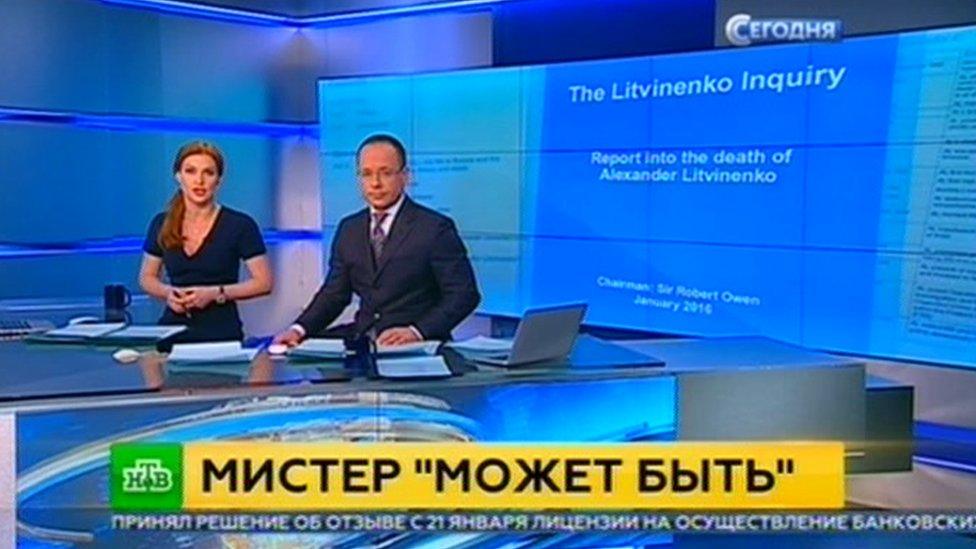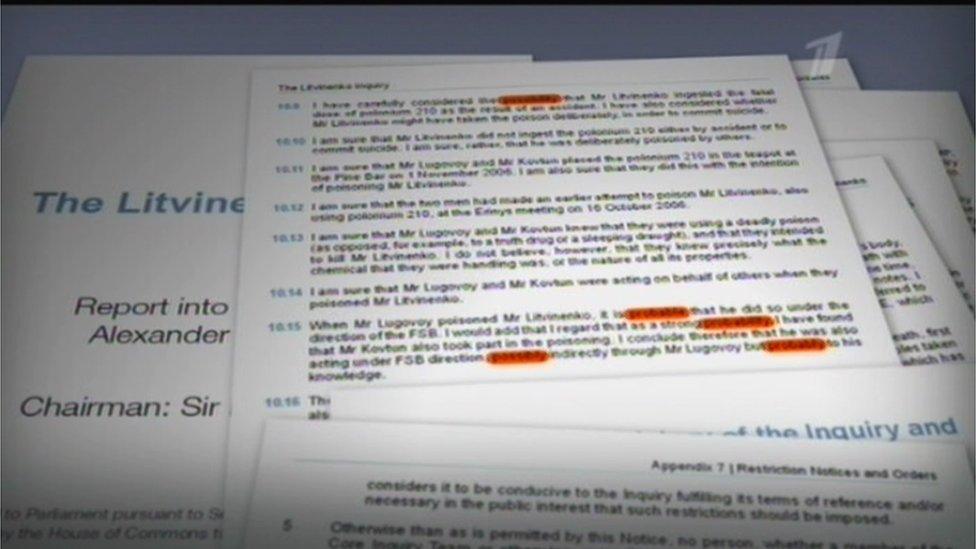Russian media conclude Litvinenko report falsified
- Published

Moscow's NTV main news called Sir Robert Owen 'Mister Maybe'
Russian media have categorically dismissed suggestions that there may be some substance to the report by Sir Robert Owen into the death of former Russian spy Alexander Litvinenko.
State media's verdict that the report was fabricated, politicised and not transparent is characteristically in tandem with the official line.
Much has been made of the fact that the report is full of words like "probably" and "possibly", and Russian state media said this compromised the veracity of the report.
"Why was the process closed and the key word in the report 'possibly'?" state TV channel Rossiya 24 said, summing up the gist of media reporting.
"Why has the UK exhumed this case now and why are the key witnesses no longer alive?"
'Mister Maybe'
Russian official state television channel Rossiya 1 and Rossiya 24 both downplayed the link between Putin and the polonium poisoning of Litvinenko in London nine years ago.
Much airtime was spent "brushing off" the Litvinenko inquiry - Vitaliy Shevchenko.
Correspondents' reports from London translated the word "probably" as "vozmozhno" ("possibly"), which they kept repeating and stressing, further softening the implications by adding words "even" and "allegedly".
Reporting from London for Rossiya 24, correspondent Aleksey Khabarov used "possible" three times in a single sentence, saying: "It is possible that they [Andrey Lugovoy and Dmitriy Kovtun] acted on the instructions of the Federal Security Service [FSB] of Russia and it is even possible, as he said, that the former head of the FSB Patrushev was involved and, allegedly, the operation was possibly conducted with the approval of President Putin."
According to the Moscow-based NTV channel, Judge Sir Robert Owen is "Mister Maybe". A presenter said that Owen "blamed Lugovoy and Kovtun, entirely predictably and ignored all the evidence to the contrary".
In using words like "possibly", "the judge, Sir Robert Owen, seems to be denying responsibility for the report and could change his mind at any time", another NTV presenter said. She added that there was "nothing new" in the report.

Russian TV channels homed in on the use of the words "possibly" and "probably"
Discrediting Russia
One pundit on NTV argued that secret services do not use radioactive means for killings "because it's hard to hush it up so this whole thing is a put-up job to discredit Russia".
The correspondent said the whole affair was opaque: MI6 did not give evidence and the inquiry went nowhere for six years after Litvinenko's death.
The correspondent concluded: "London's illegitimate conclusions in the Litvinenko case will not remain without serious consequences, according to Moscow. Our country's reaction will come after careful study of the report and it will probably be exceedingly harsh."
Russian foreign ministry spokeswoman Mariya Zakharova's statement that Western colleagues were engaged in "theatre of absurd" and "theatre of shadows" was aired prominently on main channels. She said the inquiry was "about as closed and secret as it could have been".
Several social media posts jeered at what they portrayed as a tendency to blame Russia for every crisis.
"Drivel statement already picked up by Ukrainian media" said Twitter user Zampolit, external under a hashtag that translates as "Putin may have approved it", with users posting their thoughts on infamous events that the British could pin on the Russian president.
Warming to the theme, Twitter user Dmitriy Khomutov, external wrote: "Massacre of the native population of America by European democrats and humanists"; while Rishikesh News, external tweeted "Putin possibly approved the nuclear holocaust of Hiroshima and Nagasaki".
BBC Monitoring reports and analyses news from TV, radio, web and print media around the world. You can follow BBC Monitoring on Twitter, external and Facebook, external.